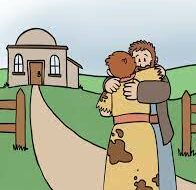
One of the things that makes it quite obvious that the father in the parable of the prodigal son is not any ordinary father, but a metaphor about God, is the abundance of love and mercy that the father had for his son. When the son asked for his share of inheritance, the father did not object nor force the son to stay. That is a testament to the free will that God gives to every human being. Anyone who decides to leave God can do so anytime, and God does not force anyone to stay with Him.
As the son faced tragedy and realized his mistake, he thought of his father and how good life was with his father. Therefore, he resolved to repent and return to his father. The father welcomed the son with open arms and with great enthusiasm ordered a feast to celebrate the return of his son. That illustrates what Jesus had previously said: “There will be rejoicing among the angels of God over one sinner who repents.” (Luke 15:10)
The older son who never left his father’s side found out about the feast for his younger brother and became angry. He complained to his father that he had always been faithful in his duties as a son but his father had never given a feast in his honor. There were two things that the father said in response to his older son: the first was that all the time he was with his father, everything the father had was his to use. The second was that the return of the younger son alone justified the great rejoicing – he was dead and has come back to life, he was lost and has been found; therefore, the older son must join in to celebrate his younger brother’s return.
“My son, you are here with me always; everything I have is yours.” (Luke 15:31) The older son had access to everything that the father had: food, clothing, dwelling, security, etc. Whether or not he enjoyed the use of these things was left to his discretion. The older son was a metaphor of the scribes and Pharisees who took offense at Jesus that He “welcomes sinners and eats with them” (Luke 15:2). They had the covenants, the law, the prophets, the Temple and so forth. But like the older son, they guarded these things that were given to them jealously. Instead of being bountiful in mercy and generous to the people, they tie up heavy burdens and lay them on people’s shoulders (Matthew 23:4).
“Now we must celebrate and rejoice, because your brother was dead and has come to life again; he was lost and has been found.” (Luke 15:32) This is the admonition of God to all the faithful – that no one should feel resentment or jealousy whenever God welcomes back a repentant sinner. Instead of handing down a severe penalty for the son, the father gave a feast in honor of his return; in the same way, instead of giving severe reprimands and penances to the sinner, Jesus feasted with them. The older son resented the fact that his father so readily forgave his repentant son; in the same way, the scribes and the Pharisees, of time past and present, resent the fact that Jesus so readily forgives repentant sinners. We must take care not to act like the scribes and the Pharisees by condemning other people for their sins.